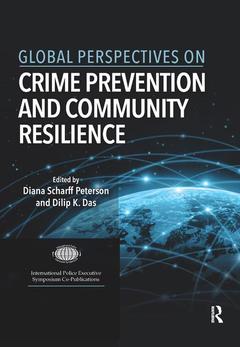Description
Global Perspectives on Crime Prevention and Community Resilience
International Police Executive Symposium Co-Publications Series
Coordinators: Scharff Peterson Diana, Das Dilip K.
Language: English
Subjects for Global Perspectives on Crime Prevention and Community...:
Keywords
Child Specific Information; National Human Trafficking Resource Center; Victimology; Trafficking Victims Protection Act; assisting crime victims; Bombing Victims; crimes against women; Human Trafficking; community policing; Victoria Police; on office body camera; English Proficiency Level; police accountability; Human Trafficking Survivors; Common Language; Civil Society; Trafficked Persons; Poor English Language Skills; Charlie Hebdo Attack; Telephone Interpreter; Sex Trafficking; Vulnerable Community Members; Islamic Supreme Council; Port Security; Psychosocial Rehabilitation; LAI; Law Enforcement Capacity; Ethnic Community Members; Commercial Sex Act; Unique Limitations; Policing Processes
Publication date: 12-2019
· 17.8x25.4 cm · Paperback
Publication date: 11-2017
· 17.8x25.4 cm · Hardback
Description
/li>Contents
/li>Readership
/li>Biography
/li>
Inspired by the dialogue between practitioners and academics of nearly thirty countries, this edited volume includes updated articles on global crime prevention initiatives and best practices in building community resilience presented at the International Police Executive Symposium?s (IPES) 25th annual meeting in Sofia, Bulgaria in 2014. A new book in the highly-regarded IPES Co-Publications series, Global Perspectives on Crime Prevention and Community Resilience offers strategies for crime and violence prevention and community initiatives for crime reduction, while promoting current best practices for police effectiveness, safety, and professionalism.
The book includes eighteen chapters from police leaders, practitioners and academics around the world in efforts to demonstrate effective strategies for the prevention of crime and innovative techniques in assisting crime victims. In an increasingly global reality, this text gives voice to valuable members of the international policing community.
Foreword. Series Preface. Acknowledgments. Editors. Contributors. Introduction. Section I: GLOBAL STRATEGIES FOR CRIME AND VIOLENCE PREVENTION. Chapter 1: Coordinated Community Response to Domestic Violence and Sexual Assault on the College. Chapter 2: Different Communities, Different Approaches: Avoiding a ‘one size fits all’ Approach to Neighborhood Policing Strategies. Chapter 3: Community-Based Participatory Approach to Prevent Residential : Burglaries and House Robberies. Chapter 4: Crossing the Great Divide: The Development and Effectiveness of Working Relationships between Law Enforcement Personnel and Academic Researchers. Chapter 5: The B3W Matrix: Managing a More Effective Way to Tackle Residential Burglary. Section II: BUILDING RESILIENCE AND ENGAGING COMMUNITIES FOR VIOLENCE AND CRIME PREVENTION. Chapter 6: Managing Language Barriers in Policing. Chapter 7: Community Policing and Vigilantism: Two Alternative Strategies for Fighting Neighborhood Crime. Chapter 8: Policing in Remote Australia: Is it Possible to Ignore Colonial Borderlines? Chapter 9: Multi-Sector Cooperation in Preventing Crime: The Case of South African Neighborhood Watch As an Effective Crime Prevention Model. Section III:ASSISTING SPECIAL POPULATIONS, WOMEN AND CRIME VICTIMS. Chapter 10: Human Trafficking: A Global Examination of Sexual Exploitation, Corruption, and Future Implications. Chapter 11: Building Community Resilience: Strategic Role of Police with Bombing Victims. Chapter 12: Women in Criminal Justice: Reality or Myth. Chapter 13: Strategies in Prevention of Crime against Women in India-with Special Reference Telangana State. Chapter 14: The Assessment of Capable Guardianship Measures against Bullying Victimization in the School Environment. Section IV:PROMOTING BEST PRACTICES FOR POLICE OFFICER SAFETY, ACCOUNTABILITY, EFFECTIVENESS, PROFESSIONALISM AND RETENTION. Chapter 15: An Analysis of the Effects of On-Body Officer Camera S
Diana Scharff Peterson, PhD, has nearly 20 years of experience in higher education teaching in the areas of research methods; comparative criminal justice systems; race, gender, class, and crime; statistics; criminology; sociology; and drugs and behavior at seven different institutions of higher education. Dr. Peterson has been the chairperson of three different criminal justice programs over the past 15 years and has published in the areas of criminal justice, social work, higher education, sociology, business, and management. Her research interests include issues in policing (training and education) and community policing, assessment and leadership in higher education, family violence, and evaluation research and program development. She was Professor of Criminology and Graduate Program Director at the University of Texas of the Permian Basin. She has published over 30 articles in areas of criminal justice, sociology, social work, business management, and higher education and is the Liaison and Representative for the International Police Executive Symposium (consultative status) for quarterly annual meetings at the United Nations meetings in New York City, Geneva, and Vienna including the Commission on the Status of Women in NewYork, New York. Dr. Peterson chaired and organized the 25th Annual Meeting of the International Police Executive Symposium entitled Crime Prevention & Community Resilience: Police Role with Victims, Youth, Ethnic Minorities and Other Partners, in Sophia, Bulgaria, July 27–August 1, 2014 (27 countries and 43 presenters). She formerly served as the Managing Editor of Police Practice and Research: An International Journal.
Dilip K. Das, PhD, is the President, International Police Executive Symposium (IPES), and was founding Editor-in-Chief of Police Practice and Research: An International Journal. After 14 years in the Indian Police Service as a Police Executive, inc




